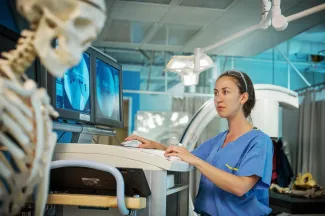"With hard work and perseverance, we may become the people we aspire to be."

Kieran Morton
- Degree:
- Doctor of Philosophy
- Grad year: 2022
- Program:
- Campus: Vancouver
I am a Biomedical Engineering graduate student, with my research focusing on soft sensors for artificial skin applications. I recently started my Ph.D. in Biomedical Engineering, after graduating from UBC with a M.A.Sc. in Biomedical Engineering from UBC and a B.A.Sc. in Electrical Engineering. My combined background in Electrical and Biomedical engineering has been a huge boon to my ability in sensor development, helping me innovate and apply technologies to a variety of areas.
I grew up in the Vancouver area and am happy to be able to represent my home through my research work at UBC. Engineering has been a passion since I was young, as my parents encouraged me to be curious and innovative with my surroundings. Working in research has been the pinnacle of my engineering experience so far, as it allows for the application of this engineering curiosity to practical issues in biomedical technology.
What has made your time at UBC memorable?
The most memorable part of my UBC experience through my time here has been the people I have met throughout. From struggling through homework and exams in undergrad together to diving into research questions in grad school, the people I have met have been a key part of the entire way. We learned together, suffered together, and ate McDonald’s pancakes at 3 am while cramming for course presentations together. The memories I made with my classmates at UBC are ones that will stay with me forever, and truly made my time at UBC memorable
How are you applying the skills you learned through your studies at UBC?
The skills I learned during my time so far at UBC have helped me both through the knowledge I have gained, and the habits I have made as a student. These are skills I am directly applying to my research, as I continue to study and build my knowledge base at the university. This includes not only the academic knowledge and hands-on skills I gained through the course curriculum, but also the habits I formed through the guidance of UBC staff and my cohort. I am bringing these skills to my research, where I am able to be a dedicated worker and innovate on the ideas I work with on a daily basis.
What advice would you give a student entering your degree program?
The greatest advice I could give to a new engineering student at UBC is to explore all of the opportunities presented throughout the degree and to not be afraid in exploring new areas of study in pursuit of your passion. Finding an area of work that you are truly passionate about is a key to success in engineering and university in general. Exploring a wide variety of experiences is how I was able to enter research, and helped me refine my interests down into a more focused area I was passionate about. This includes looking at engineering disciplines you may not be originally considering, even if it is just for some outreach or course experience. Get out there, meet people, and explore! You never know what you’ll find that clicks with you.
What are some contributions you would like to make when it comes to the future of work in your field?
The ideal contribution I’d like to make with my current work is the substantial advancement of prosthetic devices through the integration of haptics sensors. Limb loss is generally a huge difficulty in the lives of those affected, causing a variety of issues such as phantom pain and difficulty interacting with their environment. With my research I’d like to facilitate a pathway towards creating artificial limbs that better mimic the original, coming closer to a future where robotic limbs may function just as well as biological ones. Overall, the ideal contribution I could make in my field is to improve the lives of those my research work touches.



